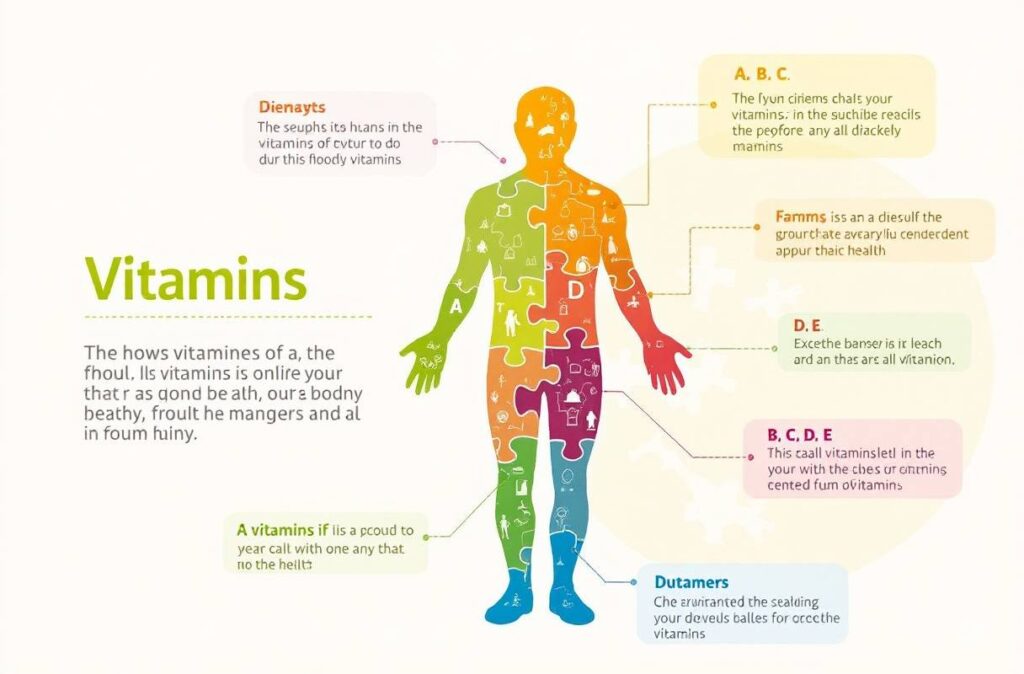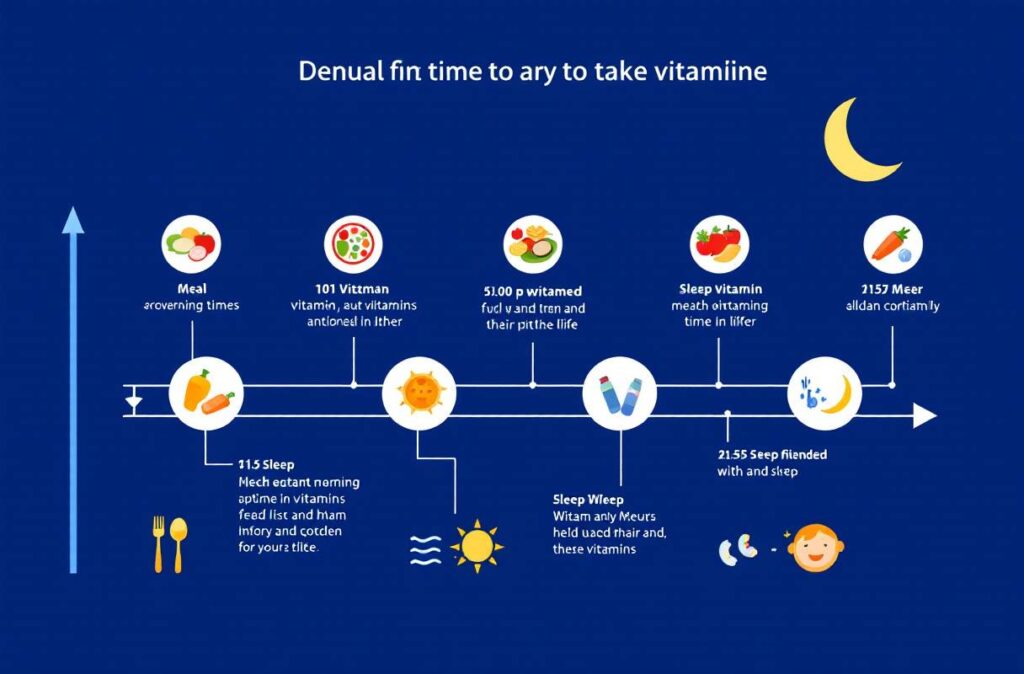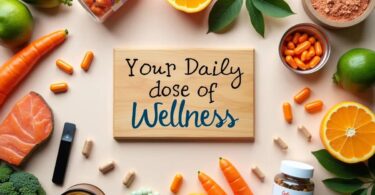Are you feeling overwhelmed by the dizzying array of vitamin bottles lining the shelves?
You’re not alone. In today’s fast-paced world, where convenience often trumps nutrition, vitamin supplements have become a popular shortcut to wellness.
But here’s the million-dollar question: are they really the magic pills we’re led to believe?
Whether you’re a fitness enthusiast, a busy professional, or simply someone looking to boost their health game, understanding the ins and outs of vitamin supplements is crucial.
Join us as we unravel the mystery behind these tiny powerhouses and discover how to make them work for you, and how to Choosing Vitamin, not just your wallet.
Why Consider Vitamin Supplements
Importance of Nutrient Intake
Getting the right nutrients is a biggie when it comes to staying healthy. Vitamins are like those VIP party-goers that keep your body’s immune system, energy levels, and cell repair working properly. Imagine them as tiny helpers your body needs. If your meals don’t deliver enough of these, supplements can step right up to help.
The table has a lineup of some key vitamins and what they do for you:
| Vitamin | Role |
|---|---|
| Vitamin A | Keeps eyes and immune system in check |
| Vitamin C | Helps make collagen and fights off those pesky free radicals |
| Vitamin D | Looks after your bones by controlling calcium and phosphate |
| Vitamin B12 | Vital for making red blood cells and nerve health |
| Vitamin E | Protects cells and keeps your skin happy |
Are you always on the go, or cutting out certain foods like meat or dairy? If so, a vitamin boost might be just what the doctor ordered, especially if your diet’s not picture-perfect.
Factors Influencing Vitamin Requirements
Not everyone needs the same vitamins all the time. Here’s how you can figure out what you need to know before picking up those vitamin bottles:
- Age: As you get older, your body’s list of vitamin demands changes. For example, older folks might need more vitamin D because their bodies don’t soak it up as well.
- Gender: Ladies often need extra vitamins, especially if they’re pregnant or breastfeeding.
- Active Lifestyle: Are you a gym junkie or always moving? Then more B vitamins may be helpful to keep your energy up.
- Health Conditions: Have issues like anemia or weak bones? Your body might be asking for more specific vitamins.
- Dietary Preferences: Cut out meat? Vegans might need a B12 boost since plant-based diets can be short in this vitamin.
Check out how different life bits can change what vitamins you need:
| Factor | How It Affects Vitamin Needs |
|---|---|
| Age | Kids, adults, and seniors all need different amounts of stuff |
| Gender | Menstruation, pregnancy, or nursing might shift needs |
| Activity Level | More energy burned means more B vitamins needed |
| Health Status | Certain conditions call for higher doses of specific vitamins |
| Diet | Vegan or veggie diets can skip vital vitamins like B12 |
By knowing what your body’s missing and understanding your own needs, you’ll see if popping a supplement is a smart move. For deeper dives into some specific nutrients, take a peek at our articles on vitamin D supplements, vitamin B complex supplements, and more through the links.
Understanding Vitamin Supplements
Vitamin supplements are a major player in keeping you feeling spry and lively. In your quest to be healthier, knowing what these little helpers are all about is pretty darn important.
“Let food be thy medicine and medicine be thy food.”
This quote emphasizes the importance of nutrition in health, which can be supported by appropriate use of vitamin supplements

What Are Vitamin Supplements
Picture supplements as the cheat code for your diet. They step in when your meals don’t cover all the bases — nifty, right? We’re talking vitamins, minerals, and other good stuff your body craves, packaged as tablets, capsules, powders, and even gummies.
Folks lean on supplements to bridge nutritional gaps or address certain health goals. Think of the juggling act that is life: you’re a pro juggling work, family, and self-care, and these supplements can keep your energy tank full. Or you might be a dedicated vegetarian, so these supplements help you nab those hard-to-get nutrients. For a peek at what’s buzzing around in vitamins, check out our vitamin supplement myths article.
Types of Vitamin Supplements
There’s a buffet of supplements out there, each with its own benefits. Let’s break down some popular choices:
| Type | What It Does | Examples |
|---|---|---|
| Multivitamins | Cover a bunch of health bases at once. | Discover how they offer a range of nutrients in our article on daily multivitamin benefits. |
| Vitamin D | Keeps bones strong and immune systems humming. | Get your fix through vitamin D supplements or fortified foods. |
| B Complex | Turbocharges your energy and brain power. | Details await in our vitamin B complex supplements article. |
| Antioxidant Vitamins | Take down oxidative stress in a one-two punch. | Vitamins C and E do the heavy lifting here. More insights at antioxidant vitamin supplements. |
| Vegan Options | Kind to animals and your nutrient intake. | Check out our guide on vegan vitamin supplements. |
| Liquid Forms | Good for easy sippin’, appreciated by older folks. | Our picks for best liquid vitamins are worth checking out. |
| Gummies | Fun to chew and ditch the pill routine. | Delve into gummy vitamin effectiveness. |
There’s a host of options out there tailored to your pace and health targets. Give those labels a good read. Our vitamin supplement labels article will show you why that’s not just a good idea but a great one.
Assessing Your Needs
Picking out vitamin supplements is a bit like a treasure hunt for your health. It’s all about figuring out what you need and what your goals are, so you aren’t just grabbing bottles of random pills.

Dietary Gaps and Deficiencies
Think of your diet like a jigsaw puzzle. Sometimes, a piece or two might be missing. That’s where vitamins come in. Not everyone gets all they need from food alone. Maybe you don’t get much sunshine, you’re on a special diet, or just have a lifestyle that doesn’t always allow you to eat perfectly balanced meals.
Here are a few vitamins and who might need a little extra help:
| Vitamin | Who Might Need It |
|---|---|
| Vitamin D | If you’re older, avoid the sun, or live closer to the North Pole than the equator |
| Vitamin B12 | If you’re a vegetarian, vegan, or, let’s be honest, no longer a spring chicken |
| Iron | Expecting moms, those with heavy periods, or folks who don’t eat meat |
| Folate | Women expecting or wanting babies |
If you think you might be missing something, chat with a healthcare professional. A simple blood test can give you all the gossip on your nutrient levels and help you figure out a plan. For more scoop on why vitamins can be so helpful, have a look at our article on vitamin supplements.
Individual Health Goals
Your health goals are like your GPS for choosing vitamin supplements. Whether you’re after feeling all-around great, packing a punch in the gym, or zeroing in on a health nook, knowing what you want can point you to the right vitamins.
Check out some typical goals and what goes with them:
| Goal | Vitamins to Think About |
|---|---|
| Overall wellness | Good ol’ multivitamin, Vitamin D |
| More energy | B vitamin bunch, Iron |
| Glowing skin | Antioxidants, Vitamin E |
| Support during pregnancy | Prenatal vitamins, Folate |
Before picking out your supplements, think about what you’re trying to achieve and how these vitamins might help you. Stay smart, avoid the myths floating around, and get the real lowdown from our article on vitamin supplement myths.
By checking out both your diet shortfalls and personal health ambitions, you can be spot-on with your vitamin supplement choices. Make sure they’re the best match for you and keep you feeling great.
Choosing the Right Vitamin Supplements
Picking the right vitamin supplement is kind of like choosing the perfect pizza: it’s got to be just right for you. To get it right, you need to think about stuff like how pure they are, how well your body can absorb ‘me, and if there are any surprise ingredients you’d rather skip.
“The art of medicine consists in amusing the patient while nature cures the disease.”
This quote reminds us that while supplements can be beneficial, they should be part of a holistic approach to health, not a standalone solution.
Quality and Purity Standards
You wouldn’t buy a car without a test drive, right? Same goes for your vitamins. The quality and purity totally matter. Look for supplements that have a seal of approval from an independent group. You can trust it’s good stuff, just as the label promises, minus any nasty extras.
| Certification | What It Means |
|---|---|
| USP Verified | The U.S. Pharmacopeia gave it a thumbs-up. |
| NSF Certified | Tested up, down, and sideways for quality. |
| Non-GMO Project Verified | No funky genes here. |
| Organic Certified | Grown the wholesome way. |
Want a deeper dive into those labels? Check out our piece on vitamin supplement labels.
Form and Absorption Rates
Forms matter just like how you take your coffee. You got options: tablets, capsules, powders, gummies. Each has its quirks and perks, so it’s all about what suits you best and makes your belly happiest.
| Form | Absorption Rate | Pros | Cons |
|---|---|---|---|
| Tablets | Medium | Wallet-friendly | Could lodge in your throat |
| Capsules | High | Goes down easy | Your wallet might cry |
| Powders | High | Mix it up, drink it up | Some assembly required |
| Gummies | Medium | Like candy, but healthy | Sneaky sugars lurk |
Lifestyle matters: Pick gummies? Be sure to check our article on gummy vitamin effectiveness.
Additional Ingredients and Allergens
You gotta read the fine print. Look for anything fishy in the ingredients that your body might not love. Whether it’s allergies or being plant-based, choose the ones that vibe with your needs.
| Potential Allergy Ingredients | Alternatives |
|---|---|
| Gluten | Go gluten-free |
| Dairy | Dairy-free is the way |
| Soy | Check out soy-free options |
| Shellfish | Vegan is your pal |
For our veggie friends, peek at our take on vegan vitamin supplements to see what’s cooking.
Thinking through these points helps you find a vitamin match that’s just your style. You’ll be on your way to reaching those health goals in no time!
Factors to Consider
Alright, so you’re on the hunt for vitamin supplements. There’s a bunch of stuff you got to think about to make sure you’re picking the right ones. Let’s break it down.
Age and Life Stage
Your age? Yep, it matters big time. Every age has its own nutritional needs. Kids are growing like weeds, so they need stuff that’ll support that wild ride, while older folks might need a little help keeping those bones strong and immune systems on the up and up.
| Age Group | Key Nutrients to Consider |
|---|---|
| Kids (1-12 years) | Vitamin D, Calcium, Iron |
| Teens (13-19 years) | Vitamin A, Vitamin C, B Vitamins |
| Adults (20-64 years) | Multivitamins, Vitamin D, Omega-3 |
| Seniors (65+ years) | Vitamin D, Calcium, B12 |
Lifestyle and Activity Levels
How you live and move plays a huge part too. If you’re a gym rat or run marathons for fun, you might need some extra stuff to keep your energy up and muscles in check. If you’re office-bound and feeling the stress, some supplements can help you keep it together.
| Lifestyle | Recommended Supplements |
|---|---|
| The Active Ones | B Vitamins, Vitamin C, Antioxidants |
| Desk Warriors | Multivitamins, Omega-3 |
| Moms-to-Be | Prenatal Vitamins, Folate |
| Hustling Pros | Stress Support Formulas, Vitamin D |
Specific Health Conditions
Got some health quirks? Well, certain vitamins can lend a hand there too. Like, if you’re dealing with anemia, you might reach for iron; osteoporosis? Go for calcium and Vitamin D.
| Health Condition | Suggested Vitamins |
|---|---|
| Anemia | Iron, Vitamin B12 |
| Osteoporosis | Calcium, Vitamin D |
| Immune Issues | Vitamin C, Zinc |
| Expecting | Prenatal Vitamins, Iron |
Dietary Preferences
What you eat (or don’t eat) changes the game as well. Veggie lovers or animal product-skippers, you might need to pop a few extra pills to cover nutrients you ain’t getting from plants.
| Dietary Preference | Essential Supplements |
|---|---|
| Vegetarian | Vitamin B12, Iron |
| Vegan | Vitamin B12, Omega-3 (from algae), Calcium |
| Gluten-sayers | Vitamin D, Multivitamins free of gluten |
Knowing all this stuff? It’ll help you pick out vitamins that actually matter to you. So check your age, lifestyle, health quirks, and food choices, then you’ll be choosing vitamins that’ll keep you feeling good.
Consulting with a Healthcare Professional
Why You Need Professional Advice
Before popping those vitamin supplements, have a quick chat with your healthcare expert. They’re your go-to for figuring out what your body really needs, considering your health history, what you’ve been munching on, and how you live your life. These pros can clue you in on which vitamins are actually going to help. They’ve got the lowdown on what’ll work best for you, especially if you’ve got any health stuff going on.
Talking with a pro is a surefire way to dodge all those wacky tales about which vitamins everyone thinks they should take. If you’re curious about this and want to debunk some myths, check out our piece on vitamin supplement myths.
| Benefits of Professional Advice |
|---|
| Custom-tailored tips just for you |
| Spotting those vitamin gaps you didn’t even know you had |
| Helping you hit your health targets |
| Safe and sound dosage advice |
Sorting Out Safety
When you’re thinking about sprucing up your diet with vitamin pills, safety’s the name of the game. Some vitamins don’t play well with medications or might stir up existing health conditions. That’s where your healthcare buddy comes in to guide you safely.
Wondering what you should watch out for? Well, it’s all about sticking to the right amounts and being clued-in about any weird side effects. There are some supplements that could have a different impact than you’d expect. Pregnant folks, for instance, have special vitamin needs. We’ve got more on that in our article about best prenatal vitamins.
| Safety Pointers to Keep in Mind |
|---|
| Watch out for drug clashes |
| Mind those fat-soluble vitamins – too much can mess with you |
| Check for allergies in those bottles |
| Be age-smart with your vitamins |
If you want to dig deeper, hop on over to our sections on vitamin supplement side effects and storing vitamin supplements. They’re packed with guidance on how to use and stash your vitamins so they stay safe and do their job.
Getting a healthcare professional’s advice means you’re the boss of your health game. With their help, you’ll pick the vitamin supplements that mesh perfectly with your health and fitness goals.
Incorporating Vitamin Supplements Into Your Routine
Adding vitamin supplements to your daily routine can boost your overall health, but it’s essential to watch your dosage and when you take them. Plus, keep an eye on how your body reacts.

Proper Dosage and Timing
Getting the right dosage and timing for popping those vitamin supplements is crucial. Sticking to the recommended dosages keeps you away from any pesky side effects. Here’s a quick rundown of some common vitamins and their typical recommended daily amounts for grown-ups:
| Vitamin | Recommended Daily Allowance (RDA) |
|---|---|
| Vitamin A | 900 mcg |
| Vitamin C | 90 mg |
| Vitamin D | 600 IU |
| Vitamin E | 15 mg |
| Vitamin B12 | 2.4 mcg |
Timing matters, too. Some vitamins are best taken with a meal, while others do their thing better on an empty stomach. For more details, check out our guide on when to take vitamin supplements.
Monitoring Effects and Adjustments
Keeping tabs on how your vitamin supplements affect you is the secret sauce to making sure they’re doing you good. Jot down any shifts in your health, mood, or energy in a notebook. This can clue you in on which supplements are the real MVPs and which ones might need to hit the bench.
If you’re dealing with side effects like an upset stomach or headaches, think about lowering your dose or trying a new type of supplement. You have options like vitamin B complex supplements, antioxidant vitamin supplements, or vegan vitamin supplements.
Chatting with a healthcare pro is a smart move as well. They’ll give you the scoop on how to tailor your supplement game safely. For more on what to watch out for, take a peek at our piece on vitamin supplement side effects.
By keeping an eye on your vitamin schedule, you’ll be all set to hit your health targets with flair.
Final Thoughts
Benefits of Balanced Nutrition
Eating right isn’t just for bragging rights — it’s about feeling good from the inside out. A balanced diet keeps your body running smoothly, boosts your immune system, and keeps your energy tank full. Get your fill of vitamins and minerals, and you might just sidestep some long-term health issues.
Now, don’t replace your meals with pills, but adding some vitamin boosters can help pick up the slack during hectic schedules or dietary choices. Suppose you’re all about that plant-based life — you might need to look elsewhere for Vitamin B12, which usually hangs out in animal stuff. Curious about vegan-friendly vitamins? Check out our vegan vitamin supplements.
| Nutrient | What it does for you |
|---|---|
| Vitamin C | Gives your immune system a punch, keeps your skin happy |
| Vitamin D | Looks after your bones, lifts your mood |
| Vitamin B6 | Keeps your brain sharp, balances your mood swings |
| Vitamin B12 | Keeps your nerves and blood cells in tip-top shape |
Long-term Wellness Goals
Thinking long term? Keeping yourself fit and healthy means setting some goals, and nutrition is a big player. A diet rich in nutrients, along with the right supplements, can keep you on top of your game, sharpen your mind, and help you age gracefully.
Pick supplements that gel with what you’re aiming for. Want an energy boost? Ask for an immune assist? The right supplements might have the answer. Take a peek at your vitamin supplement labels every now and then to ensure they’re doing the trick.
Watch out for the myths floating around about vitamins. Getting to the bottom of what’s true can lead to smarter choices. Some folks think all vitamins are equal, but the how and where of them—natural versus lab-made—matters a lot. Get more details in our natural vs synthetic vitamins article.
Keeping tabs on how you feel with your current vitamin game is key. Tweak things as needed to fit where you’re going health-wise. Need some tips on when to pop those vitamins? Drop by when to take vitamin supplements for your answers.
Conclusion
Navigating the world of vitamin supplements doesn’t have to feel like solving a complex puzzle.
By understanding your unique nutritional needs, considering factors like age, lifestyle, and dietary preferences, and consulting with healthcare professionals, you can make informed decisions that truly benefit your health.
Remember, supplements are meant to complement, not replace, a balanced diet. As you embark on your wellness journey, keep in mind that the best approach is a holistic one – combining smart supplementation with a nutrient-rich diet, regular exercise, and adequate sleep.
Armed with the knowledge from this guide, you’re now equipped to choose vitamin supplements that align with your health goals, potentially filling nutritional gaps and supporting your overall well-being. So go ahead, take that step towards a healthier you – because when it comes to your health, you deserve nothing but the best.
Additional Resources
National Institutes of Health (NIH) Office of Dietary Supplements:
Vitamin and Mineral Supplement Fact Sheets
Mayo Clinic:
Supplements: Nutrition in a pill?
World Health Organization (WHO):
Nutrition – Micronutrients
FAQs
1: Are vitamin supplements necessary for everyone?
Not necessarily. A balanced diet can provide most people with sufficient nutrients. However, certain groups like pregnant women, older adults, or those with specific health conditions may benefit from supplements.
2 : Can I take all my vitamins at once?
It’s generally safe to take multiple vitamins together, but some may interact or compete for absorption. It’s best to consult with a healthcare professional for personalized advice.
3 : Are natural vitamins better than synthetic ones?
Both natural and synthetic vitamins can be effective. The body often can’t distinguish between the two. Quality and bioavailability are more important factors to consider.
4 : How long does it take to see benefits from vitamin supplements?
It varies depending on the vitamin and your body’s needs. Some effects may be noticeable within a few weeks, while others may take months. Consistent use is key.
5 : Can vitamin supplements replace a healthy diet?
No, supplements should not replace a healthy diet. They are meant to supplement, not substitute, the nutrients you get from food.
6 : Is it possible to overdose on vitamins?
Yes, especially with fat-soluble vitamins (A, D, E, K) which can accumulate in the body. Always follow recommended dosages and consult a healthcare provider.



